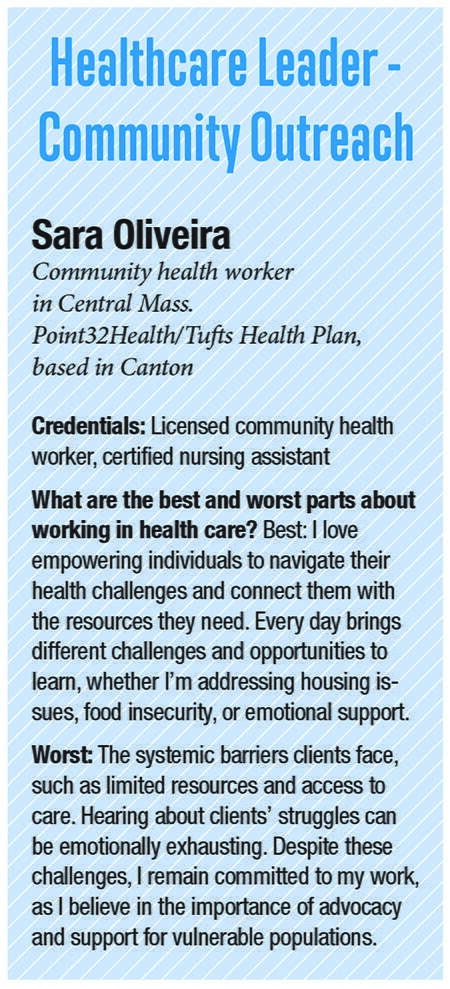
Champions of Health Care: Oliveira helps people in need with resources and compassion
 Photo | Courtesy of Sara Oliveira
Photo | Courtesy of Sara Oliveira
Sara Oliveira grew up in Brazil, in a family of pastors whose Christian faith was central to their lives.
“I saw social work being done every single day,” she said. “My parents, they were very open to our neighbors.”
Today, Oliveira continues in that tradition as a community health worker for Point32Health. She works with Tufts Health Plan members in Central and Western Massachusetts who need help outside the scope of traditional healthcare providers: emergency shelter, groceries, diapers, transportation to their next appointment, or any number of other urgent needs.

“She is kind. She’s culturally competent. She has patience to work with members. She never gives up on any situation,” Lissett Davila, manager of the Point32Health community health worker program. “She’s always looking for ways to support the community.”
Often resources are available to help with these needs, but they’re provided by many different organizations. Any individual who needs help may not be aware of how to seek them out. Oliveira and her colleagues can help determine what they’re eligible for, help them get connected, and fill out any necessary paperwork. For example, some people are eligible for free transportation through MassHealth, while others might need to get a ride from a senior center or apply for a public transportation voucher.
Oliveira described one case where she received a call from an emergency department about a woman who was coming in two or three times a week because she didn’t have a place to stay.
“We work together on that,” she said, “Get her a shelter. Get her to behavioral health, if she needs that.”
Another woman ended up needing emergency care because she had missed a month of dialysis due to a lack of transportation. Her care team realized if they simply released her, she’d end up back because the underlying issues weren’t addressed. So they called Oliveira.
Oliveira understands how overwhelming it can be to navigate these systems, particularly for people who are new to the country. She recalls arriving in Massachusetts from Brazil 29 years ago with her young son and realizing in October she needed a winter coat.
“I did not know any place that I could get a coat,” she said. “That’s all I wanted. After three months, someone gave me a coat.”
Today she sees people arriving from all over the world, needing to get an apartment and a car on top of paying for daily needs like food.
“I know what they’re going through,” she said. “It’s very hard to start life in another country.”
For Oliviera, the path was gradual to success in the U.S. She worked for 10 years as a certified nursing assistant helping elders. She found, beyond day-to-day care, she wanted to support her patients in improving their lives. She became licensed as a community health worker.
Meanwhile, her young son was growing up. Today, at 40, he’s a successful business owner, and Oliviera has two grandsons.
Oliviera speaks fluent Portuguese and some Spanish, which helps when working with immigrants. She bridges other, more subtle communication gaps. For example, some doctors or nurses may not understand a patient's missed appointment is due to difficulties with transportation and child care.
Oliviera and other community health workers help people self-advocate. Some immigrants, for example, are more comfortable with herbal medicines than pills, but they may be reluctant to explain that to their doctor, leading to potentially dangerous misunderstandings.
With a caseload of as many as 60 members at a time, Oliviera’s time is stretched thin. And the work can be emotionally draining, especially when there just aren’t enough resources available to meet members’ needs.
“Everyone has their own strategies to deal with the stress,” she said. “My strategy is my gym.”
A key to her work is understanding where people are coming from without judgment. She recalls one member who stopped her as she was closing out his case.
“He said, ‘I want to thank you. In one year that I’m out of jail, nobody helped me like you helped me,’” she said. “It’s good to hear.”
With many of her members going through difficulties of various kinds, she said, sometimes it’s important not just to give people practical information but to sit down with them and listen.
“If you don’t have the empathy and compassion, you cannot do a good job,” she said. “I cannot treat someone as just another number … I let them talk. They’re going through a lot.”









0 Comments